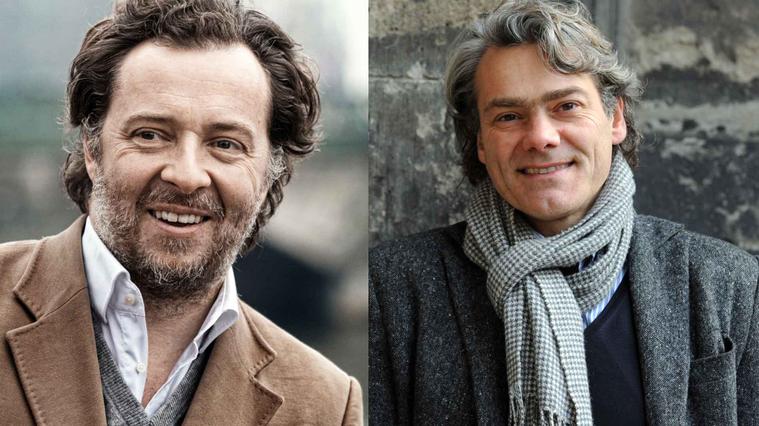A night of stirring Mahler lieder from Gerhaher and Huber

Longtime collaborators baritone Christian Gerhaher and pianist Gerold Huber returned to Washington Friday night to continue the survey of the songs of Gustav Mahler they began here two years ago at the University of District Columbia. Mahler’s songs have many lives, whether in the various piano and orchestra arrangements provided by the composer himself, or immortalized as material for his symphonies. Given Gerhaher and Huber’s reputation for exceedingly sensitive, thoughtful readings of the lieder repertoire, this recital promised a view of these works at their most sparing and intimate.
In a Vocal Arts DC presentation at the Kennedy Center’s Terrace Theater, Gerhaher seemed to be finding his footing a bit in the opening set, Mahler’s youthful Songs of a Wayfarer. In the grim opening number about the Wayfarer’s lost love, “Wenn mein Schatz Hochzeit macht,” (“When my love has her wedding day”) Gerhaher turned too quickly to affected dynamic shifts intended to echo the piano, which began to feel repetitive.
The opening of “Ging heut morgen übers Feld,” (“I walked across the fields this morning”) the Wayfarer’s manic ode to nature adapted for Mahler’s first symphony, was somewhat jarring in the dry, text-heavy treatment of the familiar tune, but ultimately convincing in the abrupt change to the sober final stanza, as Gerhaher drained the color from his voice to bring out the sense of futility in the Wayfarer’s self-pitying coda.
The following “Ich hab’ ein glühend Messer” (“I have a knife in my breast”) bristled with anguish, while the closing stanzas of the cycle, which finds the Wayfarer resigning himself to his fate beneath a linden tree — official tree of German song cycles — were exquisite. The audience leaned in to hear as Gerhaher’s voice seemed to dissolve into nothing with the final words, “Und Welt und Traum!”
Selections from Des Knaben Wunderhorn (The Boy’s Magic Horn) formed the core of the program. Perhaps more than the epic, character-driven Wayfarer songs, these wide-ranging miniatures played to Gerhaher’s prodigious ability to bring clarity to dense text and shifting narrative perspectives.
The light comedy and pastoral/fairytale themes of the songs which opened the set are perhaps the most challenging for modern (or at least non-German) listeners to fully appreciate, but Gerhaher’s sparkling diction and Huber’s playful touch at the keyboard made tongue-in-cheek pieces like “Ablösung im Sommer,” (“The changing of the guard in summer”) on the death of the cuckoo and ascendance of the nightingale, irresistible. After some insecurity in the higher reaches of the Wayfarer songs, the delicate musical demands of “Ich ging mit Lust durch einen grünen Wald,” (“I went happily through a green wood”) found Gerhaher back in form vocally, gently ascending to appealing, unforced top notes.
“Der Schildwache Nachtlied” (“The sentinel’s night song”) introduced three Wunderhorn songs treating dark and ironic themes in dialogue heavy poems. In “Nachtlied,” a vignette about a disaffected sentinel’s lonely watch, Gerhaher contrasted the sentinel’s biting sarcasm with a lover’s plaintive night song, while in the epic “Lied des Verfolgten im Turm” (“Song of the prisoner in the tower”) he conveyed growing disaffection between a prisoner, with his cynical refrain that at least “thoughts are free,” and his suffering madchen who urges him to think of the world beyond the prison.
Finally, Gerhaher delivered a scathing “Das irdische Leben,” (“Life on Earth”) setting a child’s unheard cries for bread in a desperate, almost mocking voice against the increasingly distant excuses of the mother, whose refusals lead to a bitter coda revealing the child has died.
The last two Wunderhorn selections offered perhaps some of the most beautiful moments of singing for the evening, between the gentle farewell of a soldier condemned for abandoning his post in the final stanza of “Zu Strasburg auf der Schanz” (“At Strasbourg on the ramparts”) and some floating pianissimo effects in the lullaby-like “Wo die schonen Trompeten blasen.” (“Where the splendid trumpets sound”)
The final set was Mahler’s setting of five of Friedrich Ruckert’s Kindertotenlieder (Songs on the Death of Children) poems. Where most interpreters seek out the pathos and naked emotional drama in these songs, Gerhaher turned inward, trying to capture more bewildered, unsettled aspects of grief. Leaning into the unstable tonal world of the opening “Nun will die Sonn’ so hell aufgehn,” (“Now the sun prepares to rise as brightly”) he let the pitch waver slightly around entrances and dragged behind Huber’s relentless piano, a narrator almost reluctant to participate in the song for his inability to deal with the tragedy before him.
Fleeting memories of the children’s eyes in “Nun seh’ ich wohl, warum so dunkle Flammen” (“How I see well why with such dark flames”) seemed almost unwelcome here, while the fantasy that the children have only gone out to play in “Oft denk’ ich, sie sind nur ausgegangen” (“I often think they have only gone out”) played less as a wistful rumination and more as the ramblings of a mind disordered by shock. Gerhaher closed with a cutting “In diesem Wetter,” (“In this weather”) in which he didn’t so much rail at fate as mutter impotently, the calm coda about how the children now “rest as they did in their mother’s house” exhausted and bleak.
While the orchestral arrangements of the Kindertotentlieder have their own virtues, it is hard to imagine a full orchestra matching the interpretive range achieved here. Through careful shading of tempi Gerharer and Huber were able to create a nuanced sense of emotional volatility as the narrator runs at an idea and then loses his will again. Particularly in the final song, the sparing accompaniment leaves much greater room for ambiguity than the bittersweet sense of peace and redemption found in the orchestral version.
Huber is a near ideal collaborator in this music. As might be expected from such a long term partnership, the level of coordination and precision here was nearly invisible until one thought to look for it and realized just how little explicit communication is taking place. The piano scores for these pieces offer a wonderful opportunity to appreciate Mahler’s harmonic world and sense of momentum (without the distraction of all that inventive orchestral writing) and Huber’s sensitive and transparent playing continuously highlighted these nuances.
Perhaps the only encore appropriate to follow the Kindertotenlieder, Gerhaher and Huber offered “Urlicht” (“Primeval light”) from Des Knaben Wunderhorn, the brief setting which, in more spectacular trappings, serves as the ecstatic climax of the Second Symphony. That song’s other life was little evident here though, as Gerhaher emphasized the disarming simplicity of the narrator’s earnest statements of faith.
Vocal Arts DC’s 2019-2020 season continues with soprano Michelle Bradley, 7:30 p.m. December 11 at the Terrace Theater. vocalartsdc.org; 202-467-4600







